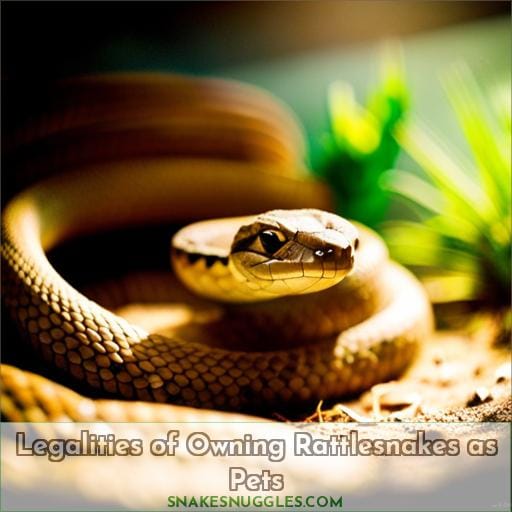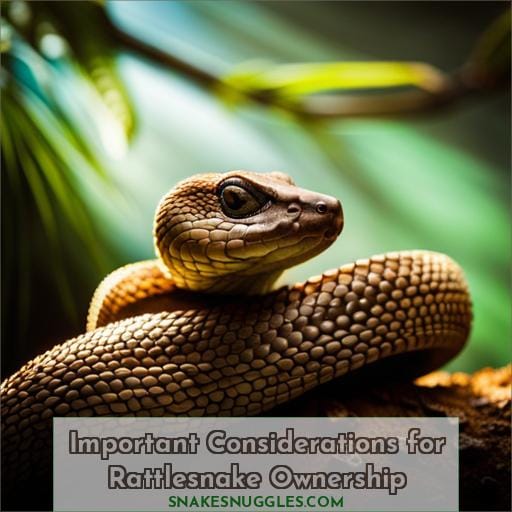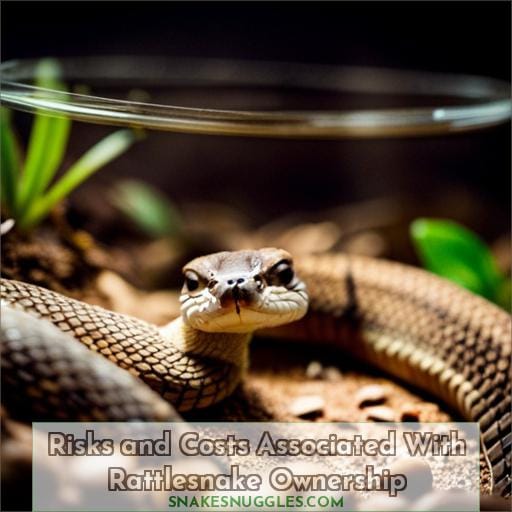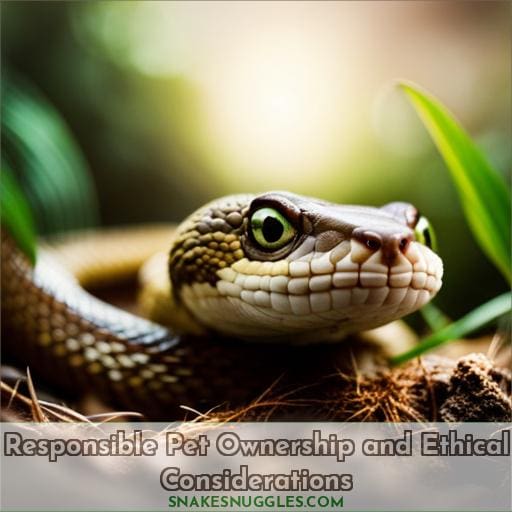This site is supported by our readers. We may earn a commission, at no cost to you, if you purchase through links.
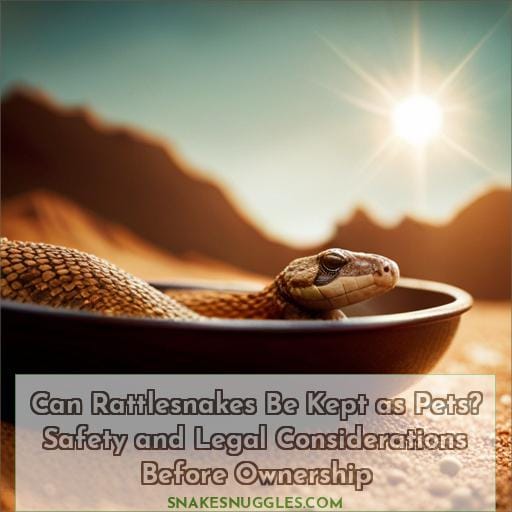 Imagine the thrill of owning a pet that slithers and rattles. Rattlesnakes, with their venomous bite and mesmerizing patterns, can certainly make for an intriguing choice. But before you rush to add one to your family, it’s crucial to consider the safety and legal aspects involved in keeping these reptiles as pets.
Imagine the thrill of owning a pet that slithers and rattles. Rattlesnakes, with their venomous bite and mesmerizing patterns, can certainly make for an intriguing choice. But before you rush to add one to your family, it’s crucial to consider the safety and legal aspects involved in keeping these reptiles as pets.
In this article, we will explore the risks associated with rattlesnake ownership and provide essential information on legal requirements.
Table Of Contents
- Key Takeaways
- Are Rattlesnakes Suitable Pets?
- Legalities of Owning Rattlesnakes as Pets
- Where to Purchase Pet Rattlesnakes
- Important Considerations for Rattlesnake Ownership
- Alternatives to Rattlesnake Pets
- Risks and Costs Associated With Rattlesnake Ownership
- Responsible Pet Ownership and Ethical Considerations
- Frequently Asked Questions (FAQs)
- What are the recommended feeding practices for pet rattlesnakes?
- Can rattlesnakes be trained or domesticated?
- Are there any health risks associated with owning a pet rattlesnake?
- What are the typical costs and expenses involved in owning a pet rattlesnake?
- What are the legal requirements for owning a pet rattlesnake in different states?
- Conclusion
Key Takeaways
- Rattlesnakes pose serious health risks from venomous bites and require specialized care and handling expertise beyond that of the average pet owner.
- Laws and regulations around exotic pet ownership vary significantly by state, requiring extensive research into legalities, permits, and penalties for irresponsible or illegal ownership.
- Docile, handleable snakes like ball pythons or corn snakes that enjoy environmental enrichment and interaction make better pet choices than typically defensive and solitary rattlesnakes.
- Ethical and responsible rattlesnake acquisition necessitates reputable breeders who prioritize health, safety, temperament and proper husbandry over economics or convenience.
Are Rattlesnakes Suitable Pets?
As a herpetologist, I can’t recommend rattlesnakes as pets given their unpredictable, defensive nature and specialized care requirements.
Their venomous bites present grave danger, even death, and most households can’t adequately meet their welfare needs.
Rattlesnakes tend to be solitary, inactive captives prone to stress and health issues without expansive, enriched enclosures and expert handlers.
Danger and Unpredictability
You’re risking serious injury and even death by keeping a rattlesnake as a pet due to their unpredictable, defensive nature.
As herpetologists and exotic veterinarians, we can’t recommend rattlesnakes as pets given their innate defensive behavior – they’re apt to strike with minimal provocation.
Even seemingly calm rattlers may unpredictably bite if feeling threatened.
We urge extreme caution and advise against rattlesnake ownership without proper precautions, training, caging, and safety measures in place.
Their venomous nature demands vigilance.
Boredom and Limited Interaction
Moreover, you can’t expect much companionship from a rattlesnake as they don’t bond with owners and have minimal capacity for interaction.
- Exploring Enrichment: Provide environmental stimuli like hiding spots and objects to mimic natural behaviors.
- Veterinary Care: Regular check-ups are crucial for maintaining the snake’s health.
- Wildlife Facilities: If interested in observing rattlesnakes, visit reputable wildlife facilities instead of keeping them as pets.
- Alternatives to Rattlesnakes: Consider other reptiles that offer more interactive experiences like ball pythons or corn snakes.
Legalities of Owning Rattlesnakes as Pets
When considering pet rattlesnakes, first check your state’s laws, as regulations vary widely.
States like Delaware, New Hampshire and Hawaii explicitly prohibit private rattlesnake ownership, while others require permits.
Even permitted states may impose restrictions on ownership, so thoroughly research your local and state statutes before obtaining a rattlesnake.
State Laws on Rattlesnake Ownership
Where legally can you own a pet rattlesnake to learn about local laws and regulations??
State laws regulating the ownership of rattlesnakes as pets vary widely, with some states allowing it with permits and others prohibiting private ownership altogether.
As you consider getting a rattlesnake pet, you’ll need to thoroughly research your state’s specific statutes first.
Understanding the state legislation, permitting requirements, and local ordinances is crucial for legal compliance when acquiring pet rattlesnakes.
It’s important to be aware of the dangers associated with keeping rattlesnakes as pets while navigating through the legal permit process.
Prohibited States
Several states’ve banned you from owning rattlesnakes altogether, including Delaware, New Hampshire and Hawaii.
- Total prohibitions
- Strict penalties
- Significant fines
These states have imposed outright bans due to major public health and safety concerns. Legal implications of violating exotic pet laws can be severe, with hefty fines or even jail time in some cases.
Where to Purchase Pet Rattlesnakes
When searching for a pet rattlesnake, you must locate a reputable breeder specializing in these animals, as they require very particular care.
Avoid purchasing a wild-caught rattlesnake, as they tend to be more defensive and prone to biting.
Research online sources to find licensed, highly experienced breeders that ethically produce captive-born rattlesnakes, enabling a smoother transition to life in captivity within proper housing.
Online Sources
You can easily find online sources to purchase pet rattlesnakes. However, credible platforms with user reviews verifying seller authenticity are crucial when adopting a pet online, given shipping concerns.
Carefully research sources, read all policies, and ask questions to confirm the rattlesnake will receive proper care.
Consider adopting locally whenever possible for the animal’s wellbeing.
Reputable Breeders
To purchase pet rattlesnakes, start by researching reputable breeders near you or online.
When acquiring a pet rattlesnake, it’s crucial to ensure ethical sourcing and legality of ownership in your state.
Look for breeders who prioritize the well-being and health of their snakes, as well as adhere to strict safety protocols.
Reputable breeders will provide detailed information about the snake’s origins and care requirements, helping you make an informed decision while prioritizing both safety and understanding in your journey into owning a pet rattlesnake.
Important Considerations for Rattlesnake Ownership
When considering owning a rattlesnake, it’s crucial to understand that expertise and experience are paramount.
These venomous reptiles require specialized knowledge in their care and handling. Safety precautions must be taken at all times to minimize the risk of bites or escapes.
Additionally, securing the rattlesnake’s habitat is essential to prevent accidents or unauthorized access by humans or other animals.
Expertise and Experience Required
One must possess considerable expertise and experience before attempting to own a rattlesnake as a pet.
- Handling Skills: Knowing how to safely handle and restrain the snake.
- Behavioral Understanding: Understanding their natural instincts, body language, and potential aggression triggers.
- Species Knowledge: Having comprehensive knowledge of rattlesnake species, including their habitat requirements, dietary needs, and health issues.
- Safety Measures: Implementing proper safety protocols for both the owner’s protection and the snake’s well-being.
It is crucial to have prior care experience with reptiles before considering acquiring pet rattlesnakes.
Handling and Safety Precautions
Employ tongs and hooks when maneuvering the rattlesnake to prevent defensive bites that could inject potent venom with lethal effects.
Securely latch the enclosure and utilize a secured shift box for cleaning to avoid escape. Carefully monitor the rattlesnake if encountering people to watch for defensive postures.
Employ the below handling techniques:
| Protocol | Purpose | Equipment |
|---|---|---|
| Hook box handling | Minimize direct contact | Gentle control hooks |
| Tongs maneuvering | Reduce defensive strikes | Extra-long snake tongs |
| Shift box transfers | Enable safe enclosure cleaning | Locking shift boxes |
Adhere to these methods to mitigate danger from the rattlesnake through limited handling and proactive safety steps.
Securing the Rattlesnake’s Habitat
After following strict safety precautions when handling your rattlesnake, you’ll need to set up an escape-proof enclosure to secure its environment.
- Tightly sealed lids and doors with secure locks
- Small ventilation holes to allow airflow but prevent escape
- Spacious interior with hides and branches for natural behaviors
Continual monitoring and scheduled cleanings uphold sanitation while reinforcing impermeability against the clever rattlesnake’s persistence to find any possible exit.
Alternatives to Rattlesnake Pets
If the significant risks and complexities of safely owning a rattlesnake deter you, consider less dangerous snakes as pets instead.
Nonvenomous colubrids like ball pythons, corn snakes, and yellow rat snakes make better pets for beginners. They rarely bite, have more predictable behaviors, and their medical care is more straightforward.
Still ensure you thoroughly research proper husbandry for any snake before obtaining it as a pet.
Laws also vary on other exotic snakes, so check your state and local regulations first.
Ball Pythons
Having covered the key considerations for owning a rattlesnake, you’re likely better off with a ball python as an alternative pet choice.
Ball pythons are popular among reptile enthusiasts due to their manageable size and docile nature.
They’ve specific dietary requirements, needing small rodents like mice or rats.
Enclosure setup should include proper heating and hiding spots.
While they may be shy at times, ball pythons can become comfortable with regular handling techniques.
Health considerations involve monitoring temperature and humidity levels to prevent respiratory issues.
Corn Snakes
If you’re considering an alternative to owning a rattlesnake as a pet, corn snakes offer a safer and more manageable option.
Corn snakes are native to the southeastern United States and thrive in various habitats such as forests, grasslands, and farmlands.
These fascinating creatures have adapted well to human environments and can be found near barns or residential areas.
With their docile nature and beautiful patterns, corn snakes make excellent pets for those seeking the thrill of snake ownership without the potential dangers associated with rattlesnakes.
Yellow Rat Snake
To explore alternative pet options, consider the Yellow Rat Snake as a potential choice for those seeking a non-venomous and docile reptile companion.
As arboreal snakes, they enjoy climbing branches and vines in their enclosure.
With calm demeanors when handled properly, these slender snakes make for engaging pets to observe their behavioral patterns without the dangers of rattlesnake ownership.
Their shimmering yellow scales and inquisitive nature charms herpetology enthusiasts.
Risks and Costs Associated With Rattlesnake Ownership
Before considering a rattlesnake, know that their bites can lead to:
- Excruciating pain
- Permanent injury
- even death
if not treated with expensive antivenom.
Their specialized care also involves costs for:
- Secure enclosures
- Vet bills
- Exams
- Possible parasite treatments
- And more,
which can easily total thousands of dollars annually.
Rattlesnakes pose immense health dangers and require major financial commitments, so examine if you can manage such hazards and expenses prior to obtaining one.
Health Risks and Bites
You’re risking severe injury or death if a rattlesnake bites you.
The venom is hemotoxic, attacking tissues and blood vessels.
Seek emergency care immediately if bitten.
Administer pressure immobilization first aid while awaiting antivenom treatment.
Symptoms include nausea, vomiting, metallic taste, tingling, sweating, and weakness.
Stay calm and contact emergency services right away.
Know if local hospitals stock antivenom, as timing is critical.
Financial Expenses
When owning a pet rattlesnake, you’re looking at high costs for:
- Securing enclosures
- Veterinary care
- Antivenin
- Meeting strict habitat requirements
As an exotic pet, specialized medical treatment, enclosures, feeding, and overall care carry significant expenses.
Budget for potential antivenin, which can surpass $3,000 per vial.
Account for permits, habitat materials, routine vet visits, exams, and unexpected care costs.
Review all financial obligations thoroughly before deciding.
Responsible Pet Ownership and Ethical Considerations
Before considering a rattlesnake, first verify your state’s laws on exotic pet ownership.
Then consult with veterinarians on the health impact captivity could have on the snake.
Finally, carefully evaluate whether you can physically secure the snake and respond to potential escape situations or defensive bites to minimize danger.
Verify State Statutes First
You’ll want to verify your state’s statutes on exotic pet ownership before acquiring a rattlesnake.
Ensure you’re aware of the legal considerations and local restrictions surrounding keeping a rattlesnake as a pet.
It’s important to stay updated with any legislative updates or changes in exotic pet laws that may affect your ability to own a rattlesnake responsibly.
Compliance verification is crucial for ensuring you’re following the proper guidelines and regulations set by your state.
Assess Animal Health Impact
To ensure responsible pet ownership and ethical considerations, it’s important to assess the impact on animal health when considering keeping rattlesnakes as pets. Animal welfare, public safety, habitat assessment, risk evaluation, and community impact are all crucial factors to consider.
By conducting a thorough evaluation of these aspects before deciding to keep a rattlesnake as a pet, you can ensure the well-being of both the snake and your surrounding environment.
| Factors | Considerations |
|---|---|
| Animal Welfare | Provide appropriate housing conditions |
| Public Safety | Assess potential risks posed by owning a venomous snake |
| Habitat Assessment | Ensure suitable enclosure with proper ventilation |
| Risk Evaluation Evaluate handling protocols for minimizing accidents |
Analyze Physical Risks Posed
As you move forward, carefully weigh the physical risks posed by rattlesnakes before acquisition, including the substantial dangers from venomous bites and defensive aggression even in captive-bred specimens.
Conduct a thorough risk assessment to understand their behavioral patterns and environmental adaptations.
Familiarize yourself with proper handling techniques to minimize potential harm.
Additionally, establish emergency protocols in case of accidental encounters or escapes.
Prioritize safety when considering pet ownership and ensure responsible practices are followed at all times.
Frequently Asked Questions (FAQs)
What are the recommended feeding practices for pet rattlesnakes?
When feeding your pet rattlesnake,
- Offer an appropriately-sized frozen/thawed rodent once every 7-10 days.
- Use long forceps to place the prey in the enclosure, monitoring from a safe distance as the snake eats.
- Never handle the snake within 24 hours after feeding to prevent defensive strikes.
Can rattlesnakes be trained or domesticated?
Rattlesnakes can’t truly be trained or domesticated. Their defensive nature remains no matter the circumstances.
With patience and care, some individuals may become accustomed to a handler’s presence over time. However, they remain wild animals driven by instinct, not affection or bonding. Caution is always essential.
Are there any health risks associated with owning a pet rattlesnake?
As their name implies, rattlesnakes can inject potent venom through bites, leading to severe tissue damage or even renal failure if untreated. Their defensive nature means even seemingly tame captives may strike with little warning.
Hence, substantial health risks exist in keeping them as pets without extensive herpetological expertise.
What are the typical costs and expenses involved in owning a pet rattlesnake?
Owning a pet rattlesnake can be quite the financial serpent, as costs slither their way into your wallet.
From vet care and parasite treatment to expensive antivenin, these expenses are nothing to hiss at.
What are the legal requirements for owning a pet rattlesnake in different states?
Different states have varied legal requirements for owning pet rattlesnakes.
Some states allow ownership with permits, while others prohibit it altogether.
It’s important to research and understand your local laws before considering a pet rattlesnake.
Conclusion
Before rushing into rattlesnake ownership, carefully weigh the risks.
Their unpredictable nature demands expertise; mishandling could prove fatal.
Furthermore, most states prohibit private possession, limiting your options.
Consider an alternative reptile that engages your intrigue without endangering your safety.
Ultimately, while fascinating, rattlesnakes don’t make suitable pets for most.


